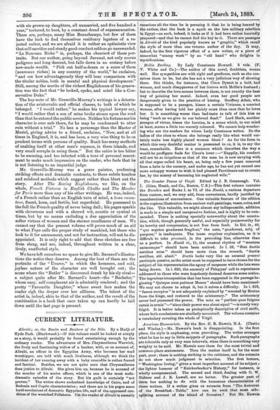Mollie Darling. By Lady Constance Howard. 3 vols. (F. V.
White and Co.)—The author of this novel, doubtless, means well. Her sympathies are with right and goodness, such as she con- ceives them to be, but she has not a very judicious way of showing them. She thinks, for instance, that Circe Dysart is a bold, bad woman, and much disapproves of her liaison with Mollie's husband ; but to describe the love-scenes between them, is not exactly the best way of pointing her moral. Indeed, even her good people are dangerously given to the practice of kissing. Geoffrey Adair, who is supposed to be a paragon, kisses a certain Vivienne, a married woman, after having told her plainly more than once that he loves- her. It is something worse than bad-taste to talk of this kiss as being " such as we give to our beloved dead!' Lord Mark, another paragon of virtue, kisses the heroine, in a scene which, to our mind at least, seems a little too warmly coloured. We cannot help wonder- ing who are the readers for whom Lady Constance writes. Do the ladies of the class to whom she belongs really like what would cer- tainly make less highly placed women blush ? As for the form in which this very doubtful matter is presented to us, it is, to say the least, remarkable. Here is a sentence which describes the way a would-be profligate feels for Circe's lover :—" Happily, his conduct will not be so iniquitous as that of the man he is now envying with all that organ called his heart, as, being only a few years removed from a babe in the nursery, and under age, he has not yet caused one more unhappy woman to wish it had pleased Providence not to create her, by the misery of becoming his neglected wife."


































 Previous page
Previous page